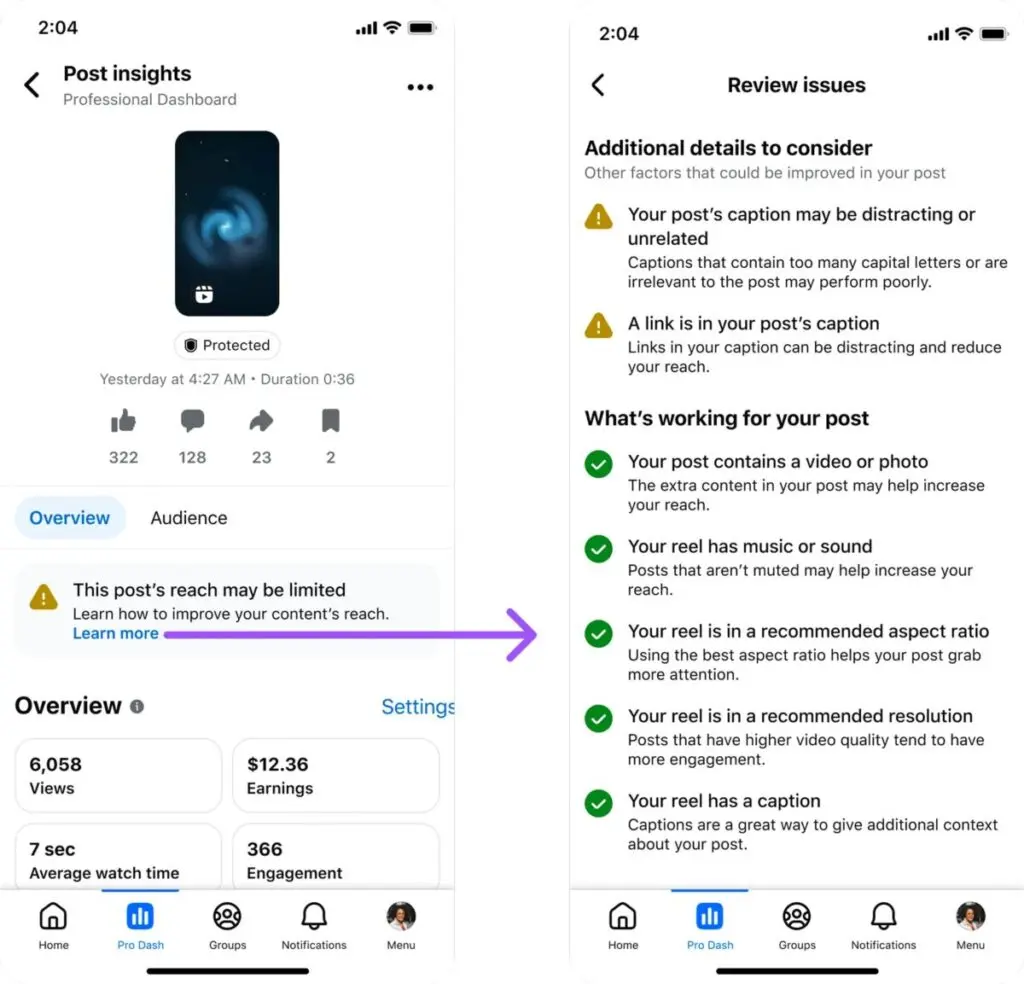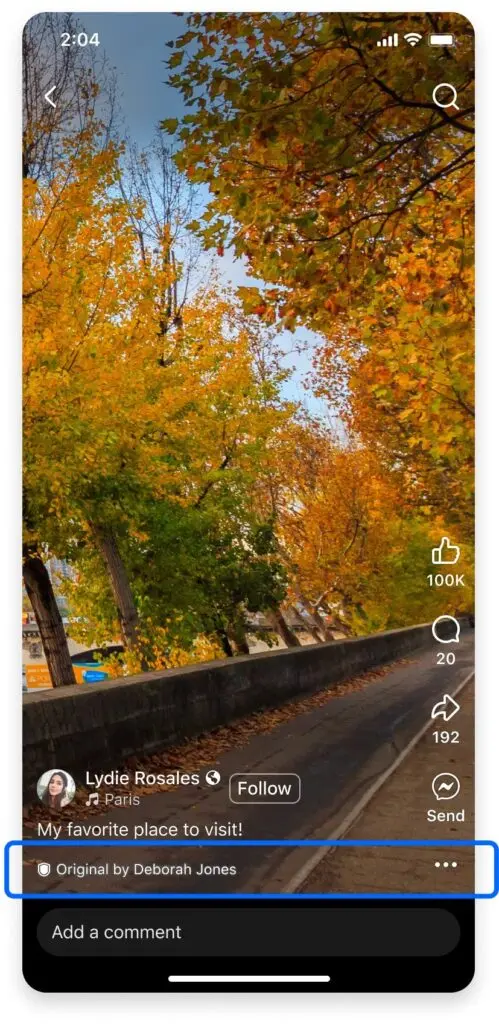- Algorithmic Demotions: Duplicate videos and posts now see reduced reach to elevate original creators.
- Monetization Penalties: Accounts repeatedly reposting unoriginal content lose access to monetization programs temporarily.
- Mass Takedowns: In H1 2025, Facebook removed 500K spammy/fake‑engagement accounts and 10 million impersonators.
- Best Practices: Creators should focus on original work, add meaningful enhancements to reshared content, avoid watermarks, and use concise, link‑free captions.
- Transparency Tools: Post‑level insights and monetization‑risk indicators help creators understand penalties and maintain compliance.
With half‑year takedowns of 10 million impersonators and stricter feed rules, originals regain prime placement.
For too long, Facebook’s News Feed bore the hallmarks of freebooting culture: endless reshared memes, recycled video clips, and copy‑and‑paste text posts crowding out genuine creativity.
Recognizing that this undermines both user experience and creator incentives, Meta has launched a sweeping algorithm overhaul. In the first half of 2025 alone, Facebook disabled roughly 500,000 accounts engaged in spammy behavior or fake engagement and dismantled 10 million profiles impersonating established creators.
But these takedowns represent only the beginning. With fresh feed‑ranking logic and enforcement tools, Facebook is redefining its platform as a showcase for original voices, ensuring that those who innovate, rather than imitate, command the visibility they deserve.
Defining “Unoriginal Content” and Its Consequences
At the heart of Facebook’s update is a clear distinction between creative appropriation and mindless replication. Meta explains that
“Unoriginal content reuses or repurposes another creator’s content repeatedly without crediting them, taking advantage of their creativity and hard work.”
In contrast, transformative uses, reaction videos, commentary overlays, or remixing trends with a unique spin remain welcome. By penalizing exact duplicates and near‑duplicates, Facebook aims to curb the endless repost cycle that once rewarded quantity over quality.
Creators whose feeds rely heavily on unoriginal assets will now face a one‑two punch: reduced distribution across their entire content portfolio and temporary suspension from monetization programs.
As Meta states,
“Accounts that improperly reuse someone else’s videos, photos or text posts repeatedly will not only lose access to Facebook monetization for a period of time, but will also receive reduced distribution on everything they share.”
This policy shift elevates the stakes: building an audience through repurposed clips is no longer tenable, and economic incentives will steer creators toward authentic production.
Algorithmic Demotions: Rebuilding the Feed Ecosystem
The engine propelling this change is Facebook’s revamped ranking algorithm. When systems detect duplicate videos or recycled text posts, those items are systematically down‑scored in News Feed. Rather than vanishing entirely—which risks penalizing well‑intentioned remixes—duplicates remain visible but far less prominent, clearing prime real estate for first‑run content.
In practical terms, an original cooking tutorial by its creator will now outrank ten reuploads with identical footage.
Meta is also experimenting with attribution links on flagged duplicates. Early tests place a discreet “View Original” link beneath reposted videos, directing viewers to the source. This not only amplifies genuine creators but also educates audiences about content provenance.
Should this feature reach full rollout, the audience journey will shift: fans discovering a viral clip can seamlessly navigate back to the originator’s page, cementing creator credit and deepening follower relationships.
Enforcement Milestones: Scale and Speed
Facebook’s latest enforcement statistics underscore the seriousness of this initiative. Between January and June 2025, the platform:
- Disabled 500,000 accounts for spammy behavior or fake engagement, cutting off networks that inflated views and likes artificially.
- Removed 10 million impersonator profiles that hijacked creators’ identities, protecting both brand integrity and user trust.
These figures build on Meta’s broader anti‑spam campaign launched in April, which targeted comment spam, like farms, and bot-driven interactions. By coupling manual account takedowns with algorithmic demotions, Facebook aims for a one‑two enforcement punch: purge the worst actors while structurally disincentivizing subtle copy‑and‑paste tactics.
Empowering Creators: Best Practices and Transparency Tools
Alongside restrictions, Facebook is arming creators with clear guidance and transparency mechanisms. The Professional Dashboard now features post‑level insights that reveal whether a specific piece of content was penalized for originality issues, allowing creators to diagnose and correct missteps.
Meanwhile, the Support home screen flags any monetization risk, showing if a Page or profile is at risk of losing revenue access due to unoriginal postings.
Meta’s published best practices emphasize genuine storytelling:
- Produce your own videos and imagery wherever possible.
- Enhance repurposed content with meaningful edits—voiceovers, commentary, narrative framing—rather than simple clip splices or watermark overlays.
- Craft high‑quality captions free of external links, using no more than five relevant hashtags to maintain contextual focus.
- Eschew third‑party watermarks that signal recycled materials and dilute feed authenticity.
These recommendations are designed not only to help creators maintain reach but to foster a culture of innovation. As Meta puts it,
“Facebook aims to be a place where original content thrives, and creators are rewarded for their hard work and creativity.”
Looking Ahead: Sustaining Authenticity in a Competitive Feed
While these changes mark a significant pivot, challenges remain. The algorithm must stay one step ahead of evolving spam tactics and AI‑enabled content farms. To truly recalibrate incentives, Facebook must maintain rigorous enforcement and close loopholes that allow bad actors to slip through.
For creators, the shift presents both risk and opportunity. Those committed to genuine storytelling will find themselves rewarded with enhanced visibility and stable monetization. Meanwhile, copycats and impersonators will struggle to reclaim lost ground.
As Facebook continues to refine attribution links and rollout further feed‑ranking tweaks, the platform’s promise is clear: originality is no longer optional—it is the currency of discovery.



